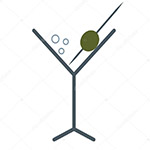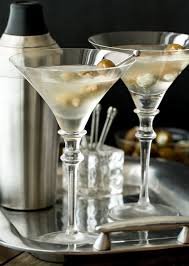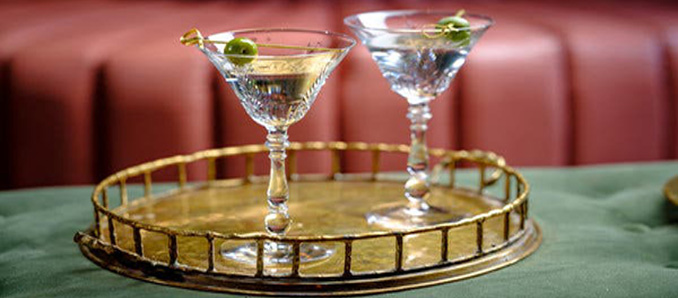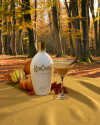 A classic cocktail party debate over whether the original martini recipe properly called for gin to be mixed with dry vermouth, or whether vodka was the progenitor of this universally recognized cocktail, is settled with little known factoids and a history lesson.
A classic cocktail party debate over whether the original martini recipe properly called for gin to be mixed with dry vermouth, or whether vodka was the progenitor of this universally recognized cocktail, is settled with little known factoids and a history lesson.
At my last martini party, I listened as those around me happily engaged in chit chat while I mixed their cocktails. Two of my good buddies, waiting for me to finish mixing a lemon drop martini for a very attractive young lady, were debating the origins of the martini cocktail.
Both implicitly agreed that the “original” cocktail involved a concoction of either gin or vodka, combined with vermouth. Paul was convinced that the original martini utilized gin. Michael had taken the vodka side of the argument. I was content to stay out of the debate.
 As I extended my hand with the lemon drop martini to deliver it to my female guest, both of my friends turned to me. It was Paul who urged me to settle the argument. Now pulled into the discussion, I took their drink orders before responding to that invitation. Of course, Michael wanted a dry vodka martini and Paul asked for its gin counterpart.
As I extended my hand with the lemon drop martini to deliver it to my female guest, both of my friends turned to me. It was Paul who urged me to settle the argument. Now pulled into the discussion, I took their drink orders before responding to that invitation. Of course, Michael wanted a dry vodka martini and Paul asked for its gin counterpart.
I began mixing each cocktail and then broke it to them. “You’re both wrong,” I said to their mutual dismay. The truth is that no one can say with any certainty who made the first martini. What we do know is that the first martini cocktail probably did not resemble what we would commonly recognize as a martini, however.
There are several stories about how the martini came about, but the most likely stories involve a bartender named Martinez. There is actually a historical basis for this as several bartender’s recipe books published prior to the turn of the 20th century use both Martini and Martinez, interchangeably. The common ingredients used more than 100 years ago were Old Tom Gin, sweet vermouth, a dash or two of Maraschino liqueur and/or orange Curaçao, and a dash of orange bitters.
The cocktail evolved over the years to become what is recognized today as the much drier martini. When gin is used, it is typically London dry gin. Dry vermouth has replaced its sweet cousin. Orange liqueurs and bitters have been done away with altogether. Of course, there are many, many variants of what is now considered the classic martini recipe and most of those add sweetness to the cocktail.
Technically, yes the original martini was likely made with gin, but it was a very different animal indeed. When all is said and done, it really does not matter all that much. We mix cocktails so that we might enjoy ourselves in a relaxed , social environment. James and Marcus both enjoyed their first of a couple of cocktails that night and quickly moved onto new subjects of debate.
, social environment. James and Marcus both enjoyed their first of a couple of cocktails that night and quickly moved onto new subjects of debate.








